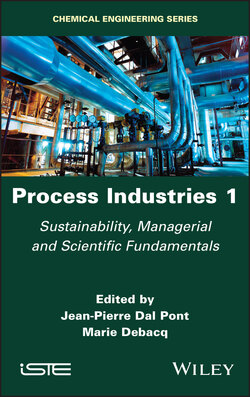Читать книгу Process Industries 1 - Группа авторов - Страница 11
Оглавление
Foreword by Vincent Laflèche
When Jean-Pierre Dal Pont asked me to write a foreword for his book, I accepted it with enthusiasm.
Not just out of friendship. We have known each other and have had the opportunity to collaborate for over 15 years. We share the same belief in the importance of strengthening links and exchanges between industrialists, researchers and teacher-researchers, between private research, academic research, and higher education.
As Deputy Director, then Chief Executive Officer of INERIS (Institut national de l ’environnement industriel et des risques), then Chairman of BRGM (Bureau de recherches géologiques et minières), and, since 2016, Director of the École des mines de Paris, I have placed the development of research in partnership with companies at the heart of my strategy, while ensuring that our upstream research activity, funded by public subsidies, constantly feeds the scientific excellence of our teams.
The École des mines de Paris adopted its strategic plan in 2017. A member of the new PSL university (Université Paris sciences et lettres, which from the outset has been among the top 50 of the best universities in the world and the top French university), the school puts scientists and engineers in an environment as close as possible to a research activity. Over 75% of the school’s activity is dedicated to research and only around 25% to teaching. Its ambition is to prepare general engineers capable of making a significant contribution to meet the major challenges of the 21st Century. Ecological transformation, with a particular focus on energy transformation, is clearly a strategic focus. The second area of focus is the digital transformation of companies, with a resolute positioning of project ownership for the school. Since the start of the new school year in September 2019, all our engineering students have common core subjects from the first year, which prepares them for Big Data processing, so as not to use words that sometimes go out of fashion quickly, such as deep learning and artificial intelligence (AI). Ensuring the scientific excellence, in particular mathematical excellence, of our engineering students clearly remains a lasting strategic marker.
The “resolute project ownership” approach means that these tools will subsequently be used in engineering projects, in contact with and paying close attention to industrial partners. The school has a long history of Big Data in geoscience to optimize drilling, whether oil or geothermal. The school was also recognized for the contribution of AI in the detection and treatment of cancers as part of its work with the Institut Curie, which is also a member of PSL. The challenge for our graduates is not only to know how to use these new tools, but also to know how to ask and design the industrial question in the wider framework opened up by these new tools, which requires a sound understanding of technological and industrial reality.
We train non-specialized engineers. For more than two centuries, the mines engineer has indeed had to integrate scientific, economic, and human dimensions, as well as management, security, openness, and solidarity that the beginnings of a professional career “basically” and inevitably inculcate. For this purpose, the school’s training combines the so-called “hard” or engineering sciences, natural sciences, and humanities and social sciences (economics, management, sociology, etc.).
The work of Jean-Pierre Dal Pont and Marie Debacq could not better fit the strategy of the school, and vice versa. The words “theory and practice” have been inscribed on the pediment of our establishment for almost two centuries. Similarly, this work is punctuated and illustrated by concrete cases. This choice can only delight the Director of the École des mines that I am. These concrete cases relate to hot topics, often widely publicized (Smart Citites, plastic recycling, etc.). It is not for the sole purpose of following the news: it is recognition of the fact that we are going through a period where we have ever faster cycles of innovation - driven in particular by the digital revolution - and that we need innovation and new technologies to meet the challenges of sustainable development, but also that these innovations are not necessarily accepted by the general public in our society, where we are seeing trust in the engineer and the expert decrease. The engineer and the scientist must integrate this dimension into their approach. The tools and methods developed in this book perfectly integrate these challenges.
This book therefore not only makes an exciting connection between the challenges of business, research, and higher education, it also opens the reader up more broadly to major societal challenges. It does so at a time when, while ecological and energy transitions are underway, the digital revolution is bringing about profound changes to the conduct of companies and industrial management.
This revolution also has consequences on society and brings its share of fears and fantasies, like those engendered by robotics. This book comes at the right time to help students, teachers, researchers, and professionals in their choices and their reflections concerning a rapidly changing world where science and technology are increasingly essential players in sustainable development.
I highly recommend it!
Vincent LAFLÈCHE
Director
École des mines de Paris
